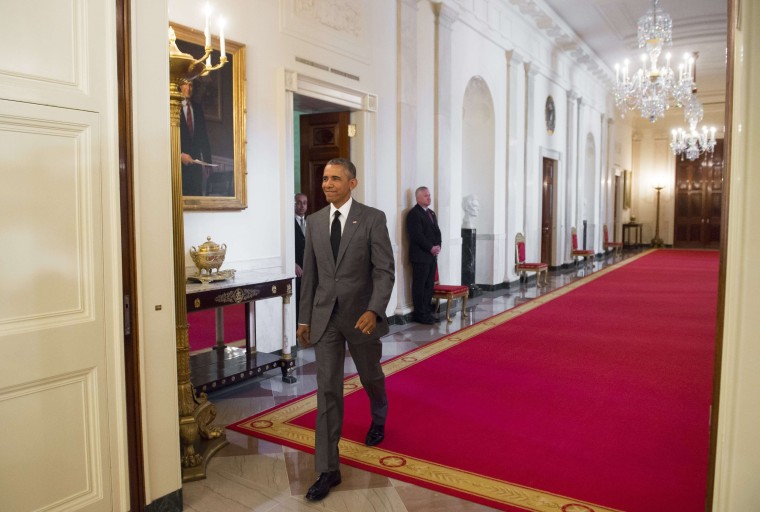President Barack Obama’s time in the White House is beginning to wind down and the discussions about his legacy will soon start to outnumber those about his policies. The numbers suggest that the nation has undergone an ideological shift during his time in the Oval Office, a trend that might be remembered as “transformational” – perhaps even Reagan-like.
With the 2016 election already in full swing, recent polling data suggest the country’s politics have moved sharply during the Obama Administration. In January, Gallup noted that the number of people who self-identify as “liberal” was at an all-time high. And the NBC News/Wall Street Journal poll has seen an uptick in the number of “liberal” Americans as well, as the Journal noted this week.
The number of liberals in both polls is still smaller than the number of conservatives and moderates, but the movement is the bigger issue. And in those polls, it’s not just growth in the percentage identifying as liberals that’s notable, it’s the decline in the number of conservatives.
You can see the NBC News/Wall Street Journal numbers on this chart.
The numbers have a special relevance where President Obama is concerned because of his professed respect for the way former President Ronald Reagan changed national politics in a larger sense. “Ronald Reagan changed the trajectory of America in a way that Richard Nixon did not, and a way that Bill Clinton did not," Mr. Obama told the Reno Gazette-Journal in 2008.
The poll numbers suggest the country is going through another shift under Mr. Obama and it appears the changes are about more than just what people want to call themselves. Consider some of the shifts on public opinion on hot-button issues over the past seven years:
- In 2008, 51 percent of Americans opposed gay marriage and only 39 percent favored it, according the Pew Research Center. A new set of numbers from Pew released this week shows 57 percent of Americans now favor it and 39 percent oppose it. That’s essentially a complete flip on the issue toward the liberal perspective.
- Marijuana legalization has undergone a similar shift in the last seven years. In 2008, 57 percent of Americans wanted the drug to be illegal and 35 percent wanted it legal, according to Pew Research data. In 2015, 53 percent want it legal and only 44 percent want to keep it illegal.
- And on the issue of income inequality there has been dramatic movement, according to data from Gallup. In 2008, 68 percent of Americans said they were “satisfied” with Americans opportunities to get ahead by working hard, while 31 percent said they were dissatisfied. That’s a 37-point difference in favor of being satisfied. Flash forward to 2014 and only 54 percent said they were “satisfied”, while 45 percent said they were dissatisfied. People are still satisfied overall, but the difference is a much smaller 9 points.
To be clear, the country has not done a complete turn politically. More people still identify as “conservative” than “liberal” in polls and attitudes on some other important issues haven’t moved.
Opinions on abortion have generally held steady over time, according to Gallup data. In fact, it’s interesting to note that Gallup’s 2015 numbers whether Americans are pro-choice or pro-life are exactly where they were in 2008 – 50 percent say they are pro-choice and 44 percent say pro-life – with some slight movement in that time on the question of when abortion should legal.
Support for gun rights has grown in many polls, despite several high-profile mass shootings over the last seven years – from Tucson, Arizona to Aurora, Colorado to Newtown, Connecticut. In April of 2008, 58 percent of those polled by Pew said controlling gun ownership was more important than protecting gun rights (37 percent). In 2014, 52 percent said protecting gun rights was more important, while 46 percent chose controlling gun ownership.
And beyond simple moves in the numbers, all of these data-points ignore the more basic question of what changes American political attitudes and sentiments. Has Mr. Obama’s presidency been transformational in some way or has he simply presided over a period of transition? Has his time in the Oval Office been a cause of change or an effect? That’s a complicated question – the same one could be asked of Mr. Reagan’s transformational time in the White House.
In the most basic sense, the recent data suggest the country has moved leftward during the Obama Administration as the American electorate begins to look ahead to 2016. The why isn’t as important what it could mean for the next presidential election.
